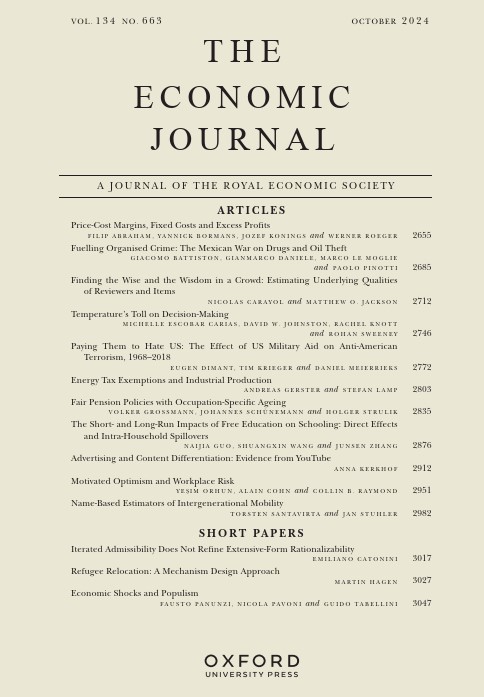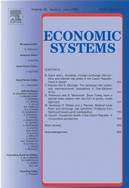Financial System Adaptability and Resilience
This research group investigates critical aspects of financial system adaptability and resilience. First, it analyses the impact of natural disasters on financial systems. Second, the group aims to investigate the effects of political preferences for the green transition. Third, the group's research analyses the role of culture in economies.
Research Cluster
Financial Resilience and RegulationYour contact

- Department Financial Markets
EXTERNAL FUNDING
08.2022 ‐ 07.2025
OVERHANG: Debt overhang and green investments - the role of banks in climate-friendly management of emission-intensive fixed assets
The collaborative project “Debt Overhang and Green Investments” (OVERHANG) aims to investigate the role of banks in the climate-friendly management of emission-intensive fixed assets. This will identify policy-relevant insights on financial regulation, government-controlled lending and financial stability, as well as raise awareness among indebted stakeholders.
01.2015 ‐ 12.2019
Interactions between Bank-specific Risk and Macroeconomic Performance
07.2016 ‐ 12.2018
Relationship Lenders and Unorthodox Monetary Policy: Investment, Employment, and Resource Reallocation Effects
We combine a number of unique and proprietary data sources to measure the impact of relationship lenders and unconventional monetary policy during and after the European sovereign debt crisis on the real economy. Establishing systematic links between different research data centers (Forschungsdatenzentren, FDZ) and central banks with detailed micro-level information on both financial and real activity is the stand-alone proposition of our proposal. The main objective is to permit the identification of causal effects, or their absence, regarding which policies were conducive to mitigate financial shocks and stimulate real economic activities, such as employment, investment, or the closure of plants.
Refereed Publications

The Political Economy of Financial Systems: Evidence from Suffrage Reforms in the Last Two Centuries
in: Economic Journal, No. 611, 2018
Abstract
Voting rights were initially limited to wealthy elites providing political support for stock markets. The franchise expansion induces the median voter to provide political support for banking development, as this new electorate has lower financial holdings and benefits less from the riskiness and financial returns from stock markets. Our panel data evidence covering the years 1830–1999 shows that tighter restrictions on the voting franchise induce greater stock market development, whereas a broader voting franchise is more conducive to the banking sector, consistent with Perotti and von Thadden (2006). The results are robust to controlling for other institutional arrangements and endogeneity.

What Type of Finance Matters for Growth? Bayesian Model Averaging Evidence
in: World Bank Economic Review, No. 2, 2018
Abstract
We examine the effect of finance on long-term economic growth using Bayesian model averaging to address model uncertainty in cross-country growth regressions. The literature largely focuses on financial indicators that assess the financial depth of banks and stock markets. We examine these indicators jointly with newly developed indicators that assess the stability and efficiency of financial markets. Once we subject the finance-growth regressions to model uncertainty, our results suggest that commonly used indicators of financial development are not robustly related to long-term growth. However, the findings from our global sample indicate that one newly developed indicator—the efficiency of financial intermediaries—is robustly related to long-term growth.

Corporate Social Responsibility and Firm Financial Performance: The Mediating Role of Productivity
in: Journal of Business Ethics, No. 3, 2018
Abstract
This study treats firm productivity as an accumulation of productive intangibles and posits that stakeholder engagement associated with better corporate social performance helps develop such intangibles. We hypothesize that because shareholders factor improved productive efficiency into stock price, productivity mediates the relationship between corporate social and financial performance. Furthermore, we argue that key stakeholders’ social considerations are more valuable for firms with higher levels of discretionary cash and income stream uncertainty. Therefore, we hypothesize that those two contingencies moderate the mediated process of corporate social performance with financial performance. Our analysis, based on a comprehensive longitudinal dataset of the U.S. manufacturing firms from 1992 to 2009, lends strong support for these hypotheses. In short, this paper uncovers a productivity-based, context-dependent mechanism underlying the relationship between corporate social performance and financial performance.

Should Banks Diversify or Focus? Know Thyself: The Role of Abilities
in: Economic Systems, No. 1, 2018
Abstract
The paper investigates whether diversification/focus across assets, industries and borrowers affects bank performance when banks’ abilities (screening and monitoring) are considered. The initial results show that diversification (focus) at the asset, industry and borrower levels is expected to decrease (increase) returns. However, once banks’ screening and monitoring abilities are controlled for, the effect of diversification/focus either gets weaker or disappears. Further, in some cases, these abilities enhance banks’ long-run performance, but in others they prove to be costly, at least, in the short run. Thus, the level of monitoring and screening abilities should be taken into consideration in understanding, planning and implementing diversification/focus strategies.

Regional Banking Instability and FOMC Voting
in: Journal of Banking and Finance, 2018
Abstract
This study analyzes if regionally affiliated Federal Open Market Committee (FOMC) members take their districts’ regional banking sector instability into account when they vote. Considering the period 1979–2010, we find that a deterioration in a district's bank health increases the probability that this district's representative in the FOMC votes to ease interest rates. According to member-specific characteristics, the effect of regional banking sector instability on FOMC voting behavior is most pronounced for Bank presidents (as opposed to Governors) and FOMC members who have career backgrounds in the financial industry or who represent a district with a large banking sector.
Working Papers

Corporate Governance Structures and Financial Constraints in Multinational Enterprises – An Analysis in Selected European Transition Economies on the Basis of the IWH FDI Micro Database 2013 –
in: IWH Discussion Papers, No. 3, 2015
Abstract
In our analysis, we consider the distribution of decision power over financing and investment between MNEs’ headquarters and foreign subsidiaries and its influence on the foreign affiliates’ financial restrictions. Our research results show that headquarters of multinational enterprises have not (yet) moved much decision power to their foreign subsidiaries at all. We use data from the IWH FDI Micro Database which contains information on corporate governance structures and financial restrictions of 609 enterprises with a foreign investor in Hungary, Poland, the Czech Republic, Slovakia, Romania and East Germany. We match data from Bureau van Dijk’s AMADEUS database on financial characteristics. We find that a high concentration of decision power within the MNE’s headquarter implicates high financial restrictions within the subsidiary. Square term results show, however, that the effect of financial constraints within the subsidiary decreases and finally turns insignificant when decision power moves from headquarter to subsidiary. Thus, economic policy should encourage foreign investors in the case of foreign acquisition of local enterprises to leave decision power within the enterprise and in the case of Greenfield investment to provide the newly established subsidiaries with as much power over corporate governance structures as possible.



















